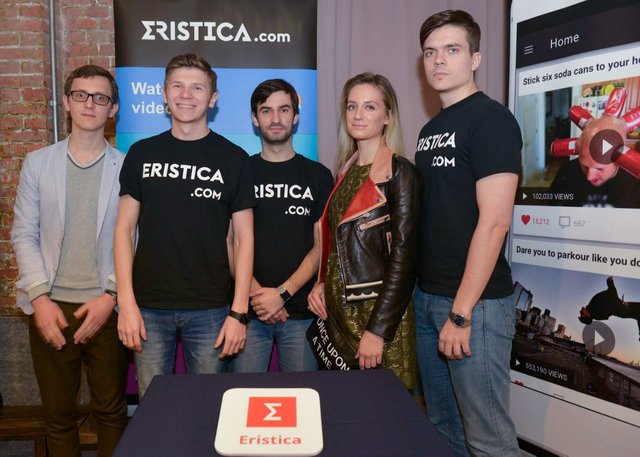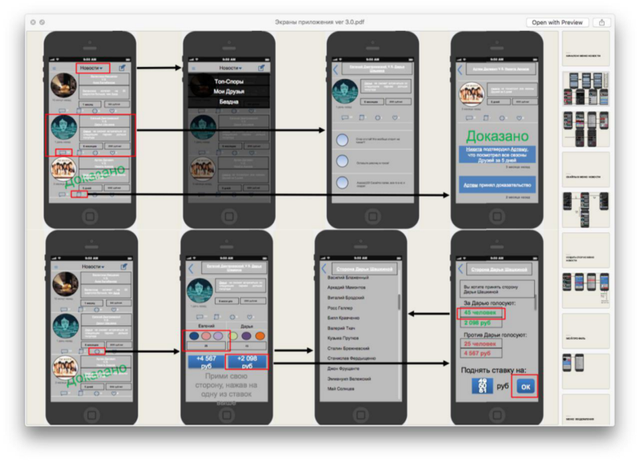Eristica. Beginning
In 2014 two amateur musicians Nikita Akimov and Artyom Dalevich had a bet — whether Nikita would manage to learn 15 guitar solos for only a couple of weeks. A box of Scotch whiskey Chivas Regal was at stake. Friends reported their betting on social networks and their followers started to comment and then requested the proof of Nikita`s challenge being succeeded at the end of two weeks.

Then the partners realized that it was a great idea to create a challenge app where people could bet and provide video proofs. That’s how a project Eristica came to be.
At the beginning entrepreneurs didnt know how to call their app. All variants seemed to be boring and unremarkable. But one day Artyoms wife said that she had heard the Greek word “heuristics” somewhere and she thought that it would serve well for the name of their project.
Developers found the meaning of the word on Internet and found out that heuristics had completely different meaning. But they managed to find a similar word “Eristica”. From the Greek it is translated as the art of winning in a dispute.
“There are a moments when you accidentally stumble upon abstruse foreign word which accurately conveys a difficult-to-explain state or phenomenon which has a long definition in Russian. And you feel that this word is what you need. It was the same moment”,
— says Nikita.
Akimov was graduated from the Economics Faculty of Moscow State University, but he was not very interested in working by his specialty — he wanted to start his own business. Dalevich studied at the Faculty of Applied Mathematics and Physics at MAI. He had some programming skills and a lot of acquaintances from this field. Friends decided that these conditions were excellent to make their mobile application and started working on it.
Nikita confesses that they had no experience and understanding of the market, so first they made many mistakes: “We just created the application in the way we wanted and we didn’t think about the strategy and in-depth analysis.”

It turned out that even for a very simple application complex algorithms were needed and friends learned all of this among the way. At first, Eristica did not look like very nice and it worked poorly. Akimov and Dalevich were gradually improving and testing their application. They offered to their friends to set up and test the app, then they started to attract users from entertainment groups in VKontakte.
“One post took about 400 rubles and after it brought us from 100 to 200 people. We were happy looking at those numbers, we completely didn’t think about the returnability of users.”
— Nikita Akimov
From the very beginning Akimov and Dalevich wanted to make an international project. In Russia there was too little audience interested in such apps. They started to travel to international conferences and collect feedback from colleagues and potential users.
One day at a conference in Japan one of the participants approached them and said that their application could become very popular with the Japanese, but they would not create the content themselves, they would only desire to watch the finished video. The Japanese have a very unusual culture, and if they lay out something provocative, they may lose their jobs or subscribers on the Internet.
Friends realized that markets in different countries are radically different. “In developed countries, for example, people like to consume content more than create it themselves, — Akimov said. — So we can not promote our application only in conventional US and Japan, ignoring developing countries. We started thinking strategically. “

When Akimov and Dalevich found out that McKinsey and Winter Capital were holding a startup competition, they decided to participate, but did not expect to win. Experience suggested that investors and mentors often do not take startups very seriously in FunTech. However, unexpectedly the startup was among the winners.
“Thanks to the mentors that we had during the contest, we changed the application a lot,” — says Akimov. After the contest, the founders came to the conclusion that the main thing in Eristica was not the wagers themselves, but the content that was obtained through disputes, and it changed the focus of the activity.
Soon after this victory, the managing partner of the US accelerator SOSV invited Akimov and Dalevich to the accelerated program MOX. “We have known him for a long time,” Akimov said. — He became interested in us after the conference Slush Asia, and we periodically called him up and told how we were doing.
“It turned out that this was generally a very valuable skill — to maintain contact with potential mentors and investors. People without experience often think that everything happens quickly: show a presentation, and then you are given money right away. In fact, it takes months to build relationships, meet, talk about your success in order to make your project interesting for investors.”
— Nikita Akimov
In April 2017, the creators of Eristica returned from the MOX — while they were participating in the program, they managed to attract about one hundred thousand users from India and South East Asia and started to gradually explore this market.
“Three months in an accelerator for a startup — it’s like three years of service on a submarine. The project completely changes. But the main point is that we have many mentors and assistants now, who we can turn for help at any time. And it’s good that we had mistakes at first, now we take the business more carefully and deeply, “
— Akimov said.
And today Eristica goes to the ICO. It was a hard and long way. We ask for everyone`s support!
Good job